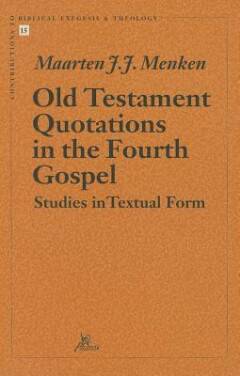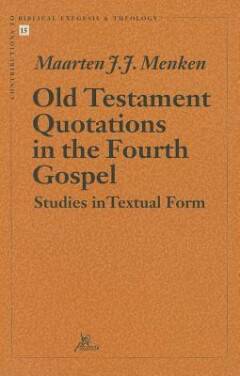
En raison d'une grêve chez bpost, votre commande pourrait être retardée. Vous avez besoin d’un livre rapidement ? Nos magasins vous accueillent à bras ouverts !
- Retrait gratuit dans votre magasin Club
- 7.000.000 titres dans notre catalogue
- Payer en toute sécurité
- Toujours un magasin près de chez vous
En raison de la grêve chez bpost, votre commande pourrait être retardée. Vous avez besoin d’un livre rapidement ? Nos magasins vous accueillent à bras ouverts !
- Retrait gratuit dans votre magasin Club
- 7.000.0000 titres dans notre catalogue
- Payer en toute sécurité
- Toujours un magasin près de chez vous
31,98 €
+ 63 points
Description
From the very beginning of Christianity, Jesus' followers have tried to legitimize their views of him with the help of the Scriptures. This means that if we wish to understand the beginning of the Christian church and of Christian theology, we have to examine the early Christian use of the Old Testament. A conspicious way of using the Scriptures consists in directly quoting from them. Eleven OT quotations in the Fourth Gospel are the topic of this study. These eleven quotations (in fact the majority of John's OT quotations) differ from the known versions of the OT, but are not free paraphrases of the OT text, in some cases, it is not immediately clear from which passage precisely the evangelist quotes. This state of affairs raises the questions which OT passages in which versions John used and how and why the quotations were modified. In this study, the questions of source and of redaction are dealt with in their interrelationship. Can we adequately explain the form of a quotation by taking into account Johannine redaction of an OT passage in a textual form which we know which we can reasonably argue ? Results of research in the field of early Jewish and early Christian exegetical techniques and devices are of course taken into account. Each of the eleven quotations is scrutinized on the points of source and redaction. It appears that John mostly used the LXX, but that where that translation did not suit his purposes, he either translated the Hebrew himself or used an other translation. He modified the quotations in agreement with extant exegetical rules, and for christological reasons. This study gives new insight into an aspect of the early Christian use of Scripture.
Spécifications
Parties prenantes
- Auteur(s) :
- Editeur:
Contenu
- Nombre de pages :
- 255
- Langue:
- Anglais
- Collection :
- Tome:
- n° 15
Caractéristiques
- EAN:
- 9789039001813
- Date de parution :
- 01-01-96
- Format:
- Livre broché
- Format numérique:
- Trade paperback (VS)
- Dimensions :
- 150 mm x 229 mm
- Poids :
- 362 g

Les avis
Nous publions uniquement les avis qui respectent les conditions requises. Consultez nos conditions pour les avis.






